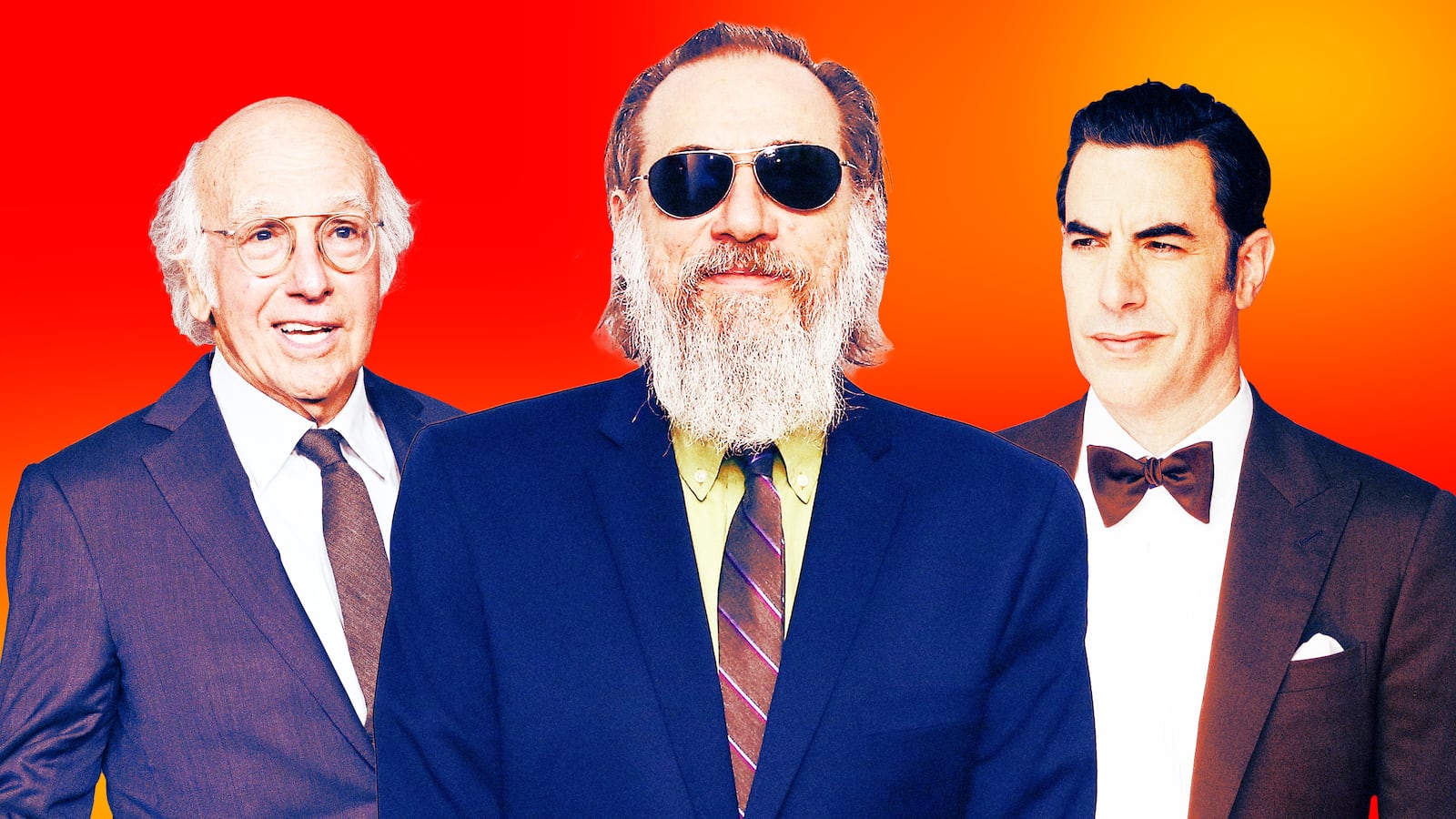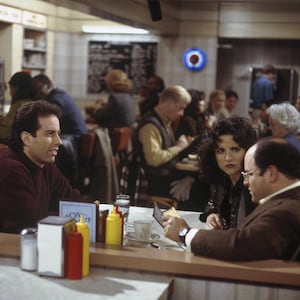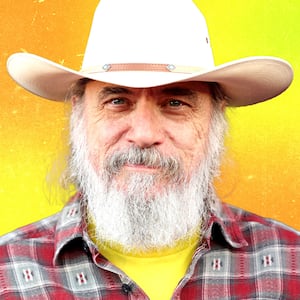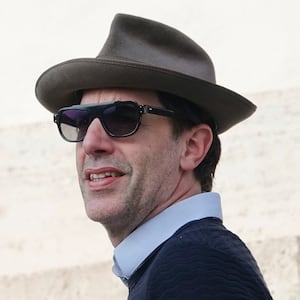Over the course of his 40-year career, Larry Charles has had two central creative relationships with Larry David (Seinfeld and Curb Your Enthusiasm) and Sacha Baron Cohen (Borat and Brüno). Now, he reveals in a new memoir out this week that he hasn’t spoken to either man in years.
In his return to The Last Laugh podcast, Charles breaks down how it all fell apart with two comedians he still considers complicated geniuses. He shares stories about how Seinfeld solved its early Elaine problem after Julia Louis-Dreyfus came to the creators sobbing and reveals why a young David Sedaris turned down an offer to write for Seinfeld. Charles also discloses what exactly it was about his HBO documentary that Larry David couldn’t stand, shares his thoughts about friends Bill Maher and Cheryl Hines flirting with MAGA, explains why there was a time he would have literally “died” for Sacha Baron Cohen and what went so wrong with their final collaboration The Dictator.
“I’ve never thought of myself as having a career,” Charles tells me early in our sprawling conversation. Instead, he says he was just “looking and flailing and groping for cool things to do, things that would excite me, things that would fulfill me on some level.”
That apparently haphazard approach somehow brought him in contact with some of the most audacious creative minds of the past half-century. In addition to working closely with Jerry Seinfeld, Larry David, and Sacha Baron Cohen, Charles writes in his new book, Comedy Samurai: Forty Years of Blood, Guts, and Laughter, about co-writing what ended up being his biggest flop, Masked and Anonymous, with Bob Dylan, and following Bill Maher around the world for their influential documentary Religulous.
Below is an edited excerpt from our conversation. You can listen to the whole thing by following The Last Laugh on Apple Podcasts, Spotify, or wherever you get your podcasts, and be the first to hear new episodes when they are released every Wednesday.
So you write in the book at length for the first time about this big conflict you had with Larry David over the HBO documentary that he was able to kill just before it was supposed to premiere. After some time has gone by, what do you feel like is the real reason why he decided that this thing just couldn’t come out? What did he not like about it?
Larry can get something in his head and not be able to let it go. And even if he says he’s letting it go, I knew him well enough at that point to know he’s not letting it go, and I have to do what I can to assuage him. So, he didn’t like the way he looked, because he wasn’t wearing makeup, and it was natural lighting. I thought he looked great. I didn’t think that was an issue at all.
And you wouldn’t think of him as someone who would care about something like that.
Well, we all have our vanity and our ego. And he, at this point, had been doing Curb for a while. He always had the clothes that he wanted. His hair was the way he wanted, even though people might not think of it, and he was in makeup. And here it was really just him sitting on a couch and talking as I would talk to him if we went out to lunch or something. So that was the first thing. I think the other main problem was at that point, he had gotten used to being funny. He was thought of as a funny person, and here in the documentary, he was just Larry. He cried. We talked about death and spirituality. We talked about his family, and so there was a kind of an intimacy to the documentary because of our long friendship that I thought was revelatory, and that the audience would really love to see this side of him. And at first, he was like, this is the best interview I ever did, I love this. He showed it to his kids. His kids loved it.

But there was something about him not being funny, not having witty answers, thinking about answers, thinking about these deeper questions and themes in his life that started to trouble him almost from the very beginning. And I sensed it. But I thought, well, maybe he’ll get over it. And I would show him the cuts, and I would even take his notes in the hopes that we would get to the broadcast in one piece. And we almost made it. But we got to that last day, the day before it was supposed to premiere, and he couldn’t take it anymore. And he did what he had to do to get the show pulled from HBO.
It’s crazy.
I know. And I talk about it in the book, but [David’s agent] Ari Emanuel was calling me and threatening me and I was told that he had also threatened HBO that they wouldn’t get another season of Curb if the thing came out.
He had the leverage. He has the power over HBO.
Exactly. And that’s what they did. They basically threatened everybody involved. And Larry was like, as Jerry used to say, “white gloves.” He didn’t want to get his hands dirty, and he allowed Ari to be the bad guy, which Ari relishes and they were able to accomplish that task. And I think to some degree, if I may make one more point about this, I think both Larry and I are on some level emotional cowards. We should have been more honest with each other right from the start that he was uncomfortable with this. What are we going to do about it? How are we going to handle this? Instead, we kind of avoided the issue until it was too late.
And you still haven’t spoken to him since?
I haven’t spoken to him, but I have to also emphasize that I’m not particularly angry or anything like that. I was very disappointed, especially at the time. I was super disappointed and just deflated, because I’d worked so hard on it. But I wasn’t angry. I think that friendships, and maybe this is true in your life, I don’t know, but it certainly is true in my life: The longer you’re on Earth, friendships fray, fall apart for various reasons. Sometimes it’s death, sometimes it’s like just going a different direction. Sometimes it’s physical distance. There are all kinds of reasons that friendships fall apart. I never expected it to happen with Larry. But when it did, it kind of fit into this philosophy I have of like, that’s the way it works. I have lots of friends from the old days that I just don’t talk to anymore for a variety of reasons, and Larry became one of those people, and I became one of those people for him as well.
Can you imagine a world where we get to see this documentary in some form someday, or is it just never going to happen?
I can imagine a world where that is seen. I’m not sure what world that is, but I can imagine it happening. I think that people are aware of it. It’s out there somewhere, and as long as it exists there’s a possibility for it to be seen.
I thought of you when Larry David was feuding with Bill Maher since you’ve worked with both of them so closely. This was when Bill Maher went to visit Trump at the White House and spoke glowingly about him and then Larry wrote this very funny piece in The New York Times, comparing it to him visiting Hitler. I was curious what you thought of that. Are you surprised by how much Bill Maher has not exactly embraced Trump, but been more sympathetic to him than anyone probably expected?
That is a surprise, for sure. I have found that he’s not quite as pro-Trump as you would think from that dinner, but I think that dinner portrayed him as somebody who was very open to Trump. And I think that perception becomes a very important quality in show business. We saw him go have dinner with Trump and Kid Rock, and he walked away saying very complimentary things. That’s what we’re left with, whatever Bill was thinking or feeling, that’s what the audience, including me, including Larry, were left with. So I thought Larry’s response to that was kind of brilliant. I think it really nailed it. I laughed through that entire piece. I thought it was a great, great piece of satire, and I think Bill would have to own that. Bill has to understand why that perception exists, because he created it. Bill has a lot of control over the perception of himself, and he made that step to connect with Trump and walk away and be complimentary, and it left people with a certain perception that is very hard to shift.

Yeah, I mean, I was surprised by how charmed he was by Trump. It seems like he really got under his spell in some way.
Well, I think if you’re an average person who eventually goes to sit with the president and hang out with the president, it’s got to have some impact on you. It’s unfortunate that that president was Trump when it happened to Bill Maher. I mean, Larry David hangs out with Obama, plays golf with Obama. And that could be made fun of too. Nobody really has, but I mean, comedians sidling up to presidents usually is a sign of a conservative bent.
Cozying up to presidents, no matter who they are, is maybe not the best decision for a comedian?
Exactly. I would agree with that. You have to be the loyal opposition.
Then there’s also Cheryl Hines, who I know you’ve worked with a lot on Curb, and that’s been fascinating to watch, too. She’s been married to Robert F. Kennedy, Jr. for a long time, but there was a perception that they had different politics, and they made it work.
Right.

But now it really seems like she’s embraced Trump and MAGA and all of that. Were you surprised by that, having known her for so long?
Cheryl, when I worked with her, was—and I’m sure she still is—a very sweet person. We never discussed politics. Nobody discussed politics really on the show, even Larry with his liberal bent. There was just too much work to do. So all of this that has happened with Cheryl and RFK Jr. is just kind of inexplicable, I think, to most of the people that were around her at the time. It makes no sense. It’s kind of crazy. Was she somehow craving power? Could that have possibly been it? There was no sign of that, as far as I could tell. So to me it is something that I can’t really explain. It’s hard for me to even believe she loves him, or that he loves her. If you see pictures of them together, you can almost feel like they’re sort of there as a professional couple, but I don’t want to assume that. Maybe they really are great with each other, and they are willing to forgive each other’s sins and see a future together. It’s hard for me to come up with an adequate explanation.
Yeah, I feel like she could have gotten out when there was the whole sex scandal with the reporter and all that. But instead, she just kind of doubled down.
Right. It was a very Melania kind of moment, in a way, that she decided to stick with it.
So I knew about your falling out with Larry David, but I did not realize that you have not spoken to Sacha Baron Cohen in years at this point either. The Dictator was your last project together. And that seems to be the source of a lot of the problems. It seems like that project, the way you write about it, was really doomed from the start. Is that how you felt?
Before I even get into this, I want to say that I try to take responsibility for my failures here. I’m not trying to point a finger at Larry, Sacha or anybody, without pointing a finger back at myself and taking my own responsibility. My own failures as a human are part of what feeds these issues. The Dictator was a very problematic project from the beginning. It started off being what I thought was going to be a classic political satire on the level of a Dr. Strangelove. The original script was very layered, greatly plotted, almost like a Billy Wilder-plotted sort of screenplay written by [Seinfeld alums] Jeff Schaffer and Dave Mandel and Alec Berg. And I thought wow, this could really be brilliant. It may not be as funny as Brüno and Borat, but neither is Dr. Strangelove, and it’s a classic. I thought this had that kind of potential.
But I think that for a variety of reasons, Sacha didn’t focus on the work the way he had in the other two movies and got distracted and also started to take on a lot of input from outside people. And I felt like he was groping and flailing, trying to find the answers when the answers were within him. And I would try to get him to trust himself, trust his instincts, which I’ve learned is the only thing you have. And instead, he was trusting so many different people with so many different contradictory thoughts that it started to just unravel and issues arose that should never have been issues.
That movie was a narrative film, and it moved away from the style that the two of you really perfected, I think, in Borat and Brüno, in which the characters are intercepting with reality. So maybe that was part of the problem, too, that he was abandoning the format that worked so well on those other movies?
Well, he had good reason to abandon it. I understood by that time he had a family. These things were really dangerous, these movies. Especially Brüno, much more so than Borat, there was so much hostility and violence in the making of and hate in the making of Brüno that I think it really shocked us. We portrayed an America that was really hateful. On Borat, people were very patient and loving—even though Borat was an anti-Semite and a rapist, and all these other things—there was an innocence to Borat, but the fact that Brüno was gay led to intense hostility right from the get go. I think he was tired and scared. And also, could he also get away with it anymore?

He was a comic genius, he really was, when he was doing those characters. There was nobody in the history of show business from Charlie Chaplin to Peter Sellers and anybody in between who did the kind of things that Sacha was doing. It was really unprecedented, and I was very impressed with it, and I would have done anything for him. But by the time we got to The Dictator he was pulling away from that whole style of work and he wanted to be more of a traditional movie star. And he was surrounding himself with more traditional show business people and getting advice from them, which I don’t think was good advice for the kind of rebel sensibility that Sacha had had up until that time. And so, for a variety of reasons, it started to kind of fragment and fracture and fall apart. And the movie’s not bad. It’s good. It’s funny. There’s actually a lot of funny stuff in it, but it just didn’t reach the potential that it had.
There was talk of a Borat sequel right after the first film came out in 2006, but Sacha and the team really dismissed it. And then, of course, about 15 years later they did make a sequel. You were not brought back to direct that one.
Nor was I interested, by the way.
You wouldn’t have done it if he had asked you to?
No, definitely not. Because first of all, I agreed with him in the first place that a sequel to that—I’m not into sequels. Sequels generally are like pale imitations of the original. The first Borat was magic. I didn’t want to touch the legacy of that movie. So even if I was in good standing with Sacha, it would have been something I would not have been excited about. I probably wouldn’t have done it, and I didn’t feel it had the inspiration behind it that the first movie did. Nor could it surprise. To try to recreate that magic felt cynical to me, and usually does with sequels.
The one really surprising moment in the movie, I will say, is that scene with Rudy Giuliani. Were you even a little jealous that they were able to pull that off?
I wasn’t jealous, but I did admire it, certainly. And I’m not criticizing anyone who was involved in it. I mean, it’s very hard to make these movies and that was a great scene. So I don’t take anything away from anybody.
The Borat sequel was produced and distributed by Amazon. Do you think that they would put out a movie like that now considering the relationship between Jeff Bezos and Donald Trump?
Everything is economics. Borat was made by Fox, which was owned by Rupert Murdoch. It would be a different movie—and maybe it would have been a more interesting movie, both of them, in some ways—if we had raised the money independently and made it outside the system. But I think if you are going to make a movie in the system, you are dealing with corporations who have shareholders and economic interests, where it can’t really be subversive if it can make money.
Is it harder to make really subversive comedy now that these corporations control everything?
Very much, very much. I mean, the algorithms and the focus groups and all the filters and barriers to making something truly subversive are very much standing now, and very hard to get around. And so, even if something seems subversive, you have to step back and go, OK, if Jeff Bezos made the movie, by its very nature, it can’t be subversive. And that’s something to really keep in mind as people are exposed to it. And that’s why, by the way, you don’t see more completely anarchic comedies. You don’t see Blazing Saddles. You don’t see Borat anymore. Because those movies snuck through the system unfiltered. And that’s almost impossible to do today.
Do you have some incredibly subversive, audacious film that you would want to make if you could?
I have many. I’m hoping to make a movie this summer, and I’m hoping that it will be that very thing, a very subversive movie. And we’ll see what happens. But I’m also looking to other forms. I’ve written this book. It’s made me think, well, maybe these screenplays that I have that I can’t get produced, maybe I should turn them into books, if anybody’s reading books anymore. But you know, all media is kind of controlled by corporations now. So it is very challenging, and I guess it’s always been that way. There’s always been corruption inherent in the form, and for an artist you just try to maintain your integrity and do the best you can.
Listen to the episode now and follow The Last Laugh on Apple Podcasts, Spotify, or wherever you get your podcasts to be the first to hear new episodes when they are released every Wednesday.









